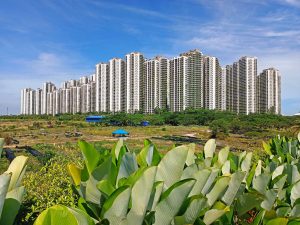Malaysia’s king is planning to seek funding from Chinese investors in order to revive a stalled high-speed rail project linking the country with its neighboring Singapore, Bloomberg reported today.
Citing a number of “people familiar with the matter,” the newspaper reported that Sultan Ibrahim Iskandar, who took over Malaysia’s rotating monarchy in January, is looking for a Chinese state-owned company to invest in the 350-kilometer HSR link, which would connect Kuala Lumpur and Singapore. According to the sources cited by Bloomberg, the king’s delegation included representatives from YTL Corp., a Malaysian firm that, according to local media reports, is one of three local companies in line to bid on the multibillion-dollar project.
Ibrahim, the Sultan of Johor, arrived in Beijing yesterday for a four-day state visit, the first by a Malaysian monarch since 2014. During the visit, Iskandar will meet with both President Xi Jinping and Premier Li Qiang, Malaysia’s Foreign Ministry said in a statement on Wednesday, and take part in celebrations marking the 50th anniversary of diplomatic relations between the two nations.
The statement said that the king’s visit symbolized the “robust state of bilateral relations between Malaysia and China” and offered “an excellent opportunity for both sides to reaffirm a shared commitment in ensuring that Malaysia-China relations continue to remain forward-looking, dynamic, and prosperous.”
The statement added that the king will be accompanied by Malaysia’s transport and housing ministers, as well as “senior officials from Istana Negara and relevant ministries and agencies.” Other media reports, such as this one by Reuters, noted that the kind would “likely seek support for projects boosting connectivity to neighboring Singapore.”
The Malaysia-Singapore high-speed rail project was first announced in 2013, but was postponed in 2018 by former Prime Minister Mahathir Mohamad, after he came to power promising to review large-scale Chinese infrastructure projects. The project, which aims to cut travel time between the two cities to 90 minutes from more than four hours by road, was eventually terminated in 2021 due to disagreements and funding constraints on the Malaysian side.
Since taking office in November 2022, Prime Minister Anwar Ibrahim has expressed some interest in reviving the project, if the cost can be substantially lowered or if the cost of the project is not funded by taxpayers. Back in June, Singaporean Prime Minister Lawrence Wong said that he was also willing to hear fresh proposals on the rail project. The cost of the project has been estimated variously at somewhere between $17 billion and $24 billion.
Ibrahim has recently emerged as a primary booster of the rail project – perhaps unsurprisingly, given that Johor sits directly adjacent to Singapore and stands to benefit from increased connectivity between the two nations. In an interview with Shannon Teoh of the Straits Times in December, just over a month before assuming the throne, Anwar expressed strong support for the rail project, which he said should “be aligned such that the border crossing is via Forest City,” a gargantuan real estate project in Johor that is being developed by China’s Country Garden and a private Malaysian company backed by the Sultan.
Since breaking ground in 2014, the $100 billion Forest City project, which involved the creation of four artificial islands in the Johor Strait, has stagnated, largely due to the COVID-19 pandemic, China’s economic downturn, and the serious financial troubles facing Country Garden. With the project standing little chance of being completed, Anwar’s administration has announced the creation of a Special Financial Zone in Forest City, where it will offer a range of tax incentives in order to attract foreign investors. The presence of the high-speed rail would certainly boost the chances of Forest City and the surrounding Iskandar Malaysia special economic zone becoming the “next Shenzhen.”
Given that the state-owned China Communications Construction Company Ltd. is already developing the East Coast Rail Link (ECRL), another multibillion-dollar railway that will connect the east and west coasts of peninsular Malaysia, it seems natural that Malaysia would sound out Beijing on the Singaporean link. During a visit to Malaysia in June, during which he attended a groundbreaking for a section of the ECRL, Premier Li Qiang said China was willing to help Malaysia develop its major infrastructure. The two sides expect the ECRL to be completed by the end of 2026.
But all of this comes at a time of growing unrest between China and Malaysia in the South China Sea, following the publication of a leaked Chinese diplomatic note ordering Kuala Lumpur to cease exploration activities in waters claimed by Beijing. The note was reportedly sent just two weeks before Anwar said that his administration did “not have a problem with China,” and complained about alleged pressure by the United States for Southeast Asian nations to take sides in its strategic competition with China. Anwar subsequently announced that Malaysia would not halt oil and gas exploration within its Exclusive Economic Zone.

































